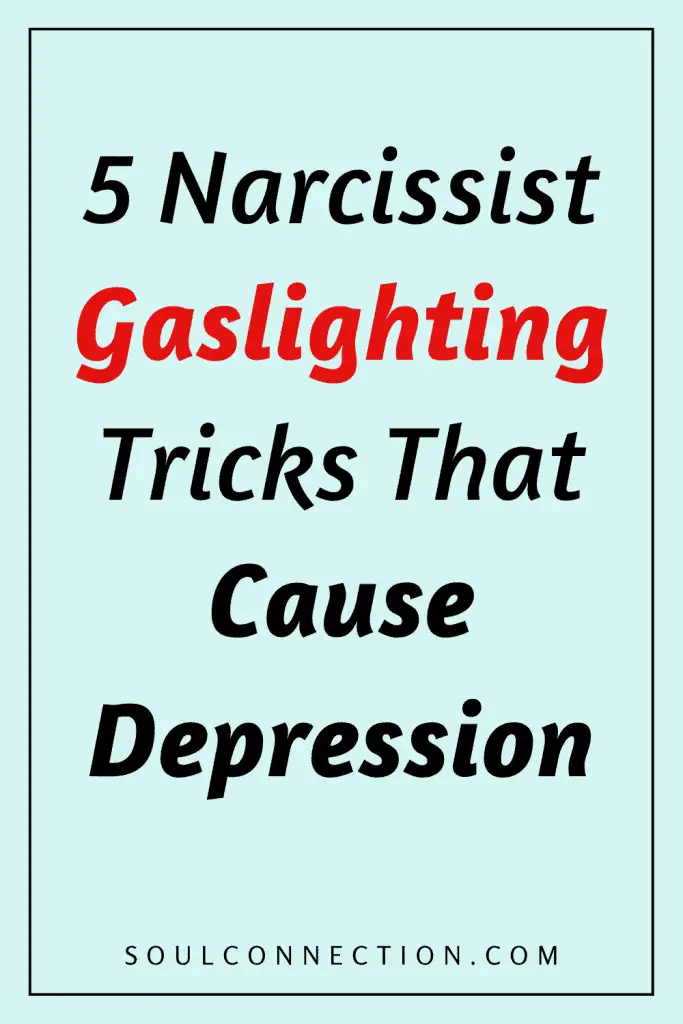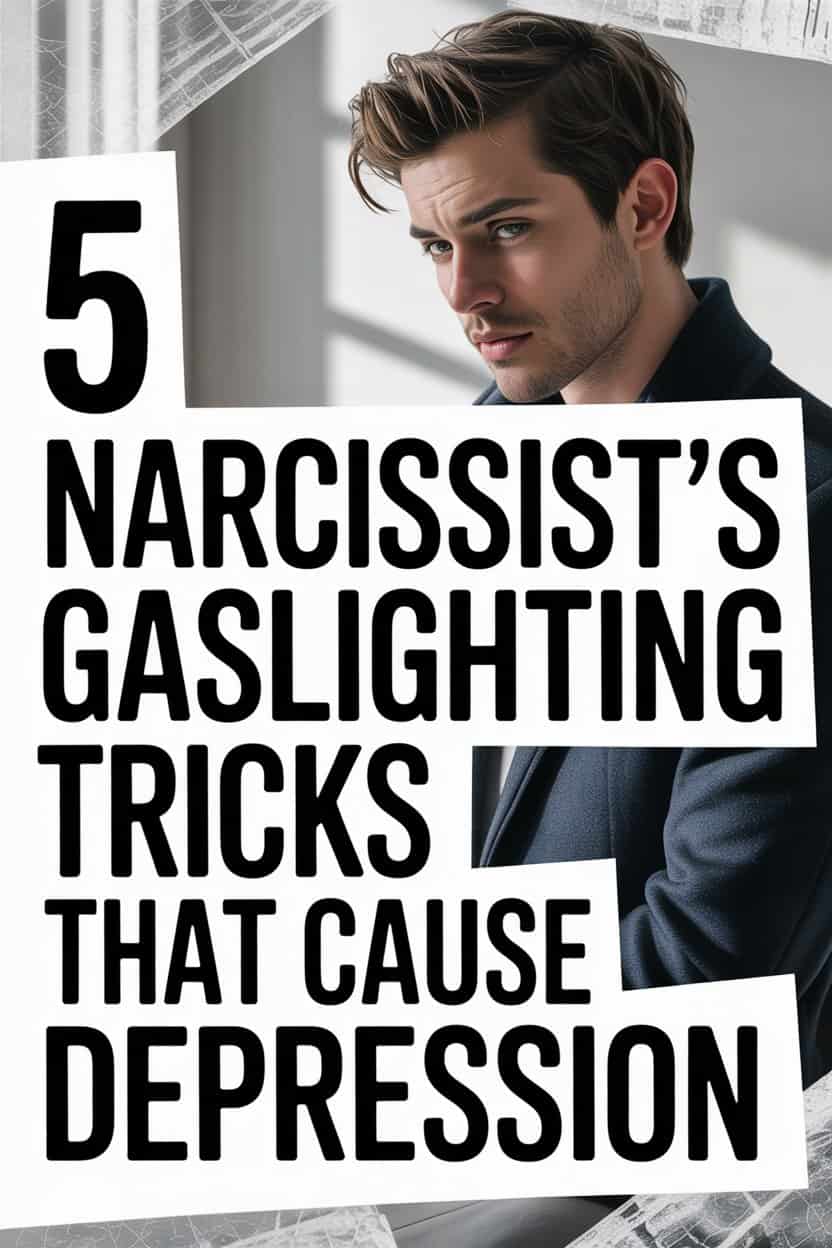Ever left a conversation feeling like your brain just did a somersault, only to land upside down with all your confidence draining out your ears?
Welcome to the world of narcissist gaslighting—where reality is optional, and your sanity is always up for debate.
If you’ve found yourself exhausted, anxious, and inexplicably sad after dealing with a certain someone, you might be on the receiving end of some classic gaslighting moves.
Depression doesn’t just fall out of the sky; it often arrives on the back of repeated emotional manipulation, which, let’s face it, narcissists treat like their own personal Olympic sport.
Wondering which tricks are at play? Here are five that can send even the steeliest soul spiraling into a depressive funk.
1. Rewriting History Like a Budget Netflix Drama
Narcissists love a good rewrite. Last week, they screamed at you over dirty dishes? Apparently, that never happened. Or if it did, it was actually YOU who lost your cool, and they were the Buddha of patience.
This constant reworking of events leaves you doubting your memory. Gaslighting pros will insist, “You’re remembering it wrong,” or, “That’s not what I said.”
Eventually, you start to wonder if you’ve developed amnesia—or if you’re just losing your mind.
Here’s the mental boomerang: When your own recollections are consistently dismissed or belittled, self-trust erodes. Self-doubt creeps in.
Over time, depression digs its claws in, whispering that you can’t even trust yourself to know what’s real.
Practical move: Start jotting down incidents, conversations, and feelings in a notebook or on your phone. When your reality is questioned, your own receipts are there to back you up.
No, this isn’t about winning arguments—it’s about anchoring yourself to reality.
2. Blame Shifting Until You’re Buried Under It
Ever apologize for things you didn’t do, just to keep the peace? Narcissists are the grandmasters of flipping the script and dumping their mistakes on your doorstep.
Forgot their anniversary? Clearly your fault, since you made life so stressful “they just couldn’t remember.” Upset over a nasty comment? Well, you’re “too sensitive,” and if you were more fun, they wouldn’t be so snippy.
This endless blame game is a one-way ticket to a shame spiral. If you swallow enough blame, depression isn’t far behind: constant guilt, second-guessing yourself, and a sinking feeling that you’re the common denominator in every problem.
Practical move: When blame is lobbed your way, pause before you accept it. Ask yourself, “Am I responsible for this, or am I just the designated scapegoat?” Setting those mental boundaries matters. Remind yourself: not everything is yours to carry.
3. The Disappearing Validation Act
Compliments, support, encouragement… blink, and they’re gone! Narcissists know that intermittent reinforcement is a powerful drug.
A rare dose of affection keeps you hooked, desperate for the next hit, but mostly you get ignored or criticized.
Just when you’re about to walk away, they’ll sprinkle in a little charm—a compliment, a thoughtful gesture, maybe a “You’re all I’ve got.” Soon as you relax, the rug is yanked from under you again.
This emotional whiplash builds anxiety and, over time, a soul-crushing sadness. Depression thrives in the gap between hope and disappointment, and narcissists are experts at keeping you stuck in that cycle.
Practical move: Stop waiting for their approval or a rare kind word. Cultivate sources of validation outside the relationship—friends, hobbies, therapy, the cashier who likes your shoes. Your worth is not a treasure buried in their opinions.
4. Minimizing Your Feelings Like It’s a Full-Time Job
Ever shared your hurt, only to be told you’re “overreacting,” “making a mountain out of a molehill,” or that “everyone gets upset sometimes”? Narcissists are allergic to your feelings—unless, of course, those feelings make them look good.
This minimization is insidious. After enough rounds of “You’re too sensitive,” it’s easy to believe your own emotions are excessive or invalid. The result? You begin to bottle everything up, convinced nobody will take you seriously, anyway.
Bottled emotions don’t just disappear; they ferment. That constant pressure, unexpressed and unacknowledged, leads straight to hopelessness and depression.
Practical move: Give your feelings space to exist. If your partner won’t listen, write out your emotions, talk to someone who does care, or say it out loud in the shower (no judgment). Just because they dismiss your feelings doesn’t mean you have to.
5. Isolation—Turning Down the Volume on Everybody Else
Narcissists don’t just want to be the center of your world; they want to be the whole universe. Friends and family become “bad influences,” “jealous,” or “don’t understand us.”
Before you know it, you’re cut off from your support system, one snide comment at a time.
Isolation is gaslighting’s evil twin. Without outside input, the narcissist’s twisted version of reality starts to seem plausible. Depression loves isolation; it grows faster in the dark.
Practical move: Fight the drift. Stay connected with people who lift you up—even if it’s just through a quick text or a five-minute phone call. Don’t let embarrassment or shame keep you in the bubble. Your people want to know you’re alright.
Pushing Back Against the Gaslight
Gaslighting creates a funhouse mirror effect: nothing looks quite right, and you’re always off-balance. That constant confusion and self-criticism lays the perfect groundwork for depression.
If any of these tricks sound uncomfortably familiar, it’s not because you’re “too sensitive” or “imagining things.” It’s because you’re experiencing real, damaging behavior that can have serious effects on your mental health.
Find ways to anchor yourself to reality—your own memory, your own feelings, your own relationships outside the narcissist’s orbit. Small, consistent steps can spark clarity, restore self-trust, and chip away at the hopelessness that gaslighting brings.
You deserve to feel steady and whole again, even if it means taking things one sticky note, one good friend, or one deep breath at a time.
Oh, and if a certain someone starts telling you you’re “making all this up”—that’s Trick #1 on repeat. You’re not crazy. They just don’t want you to trust your own sanity.
Lucky for you, you’re smarter than that.


